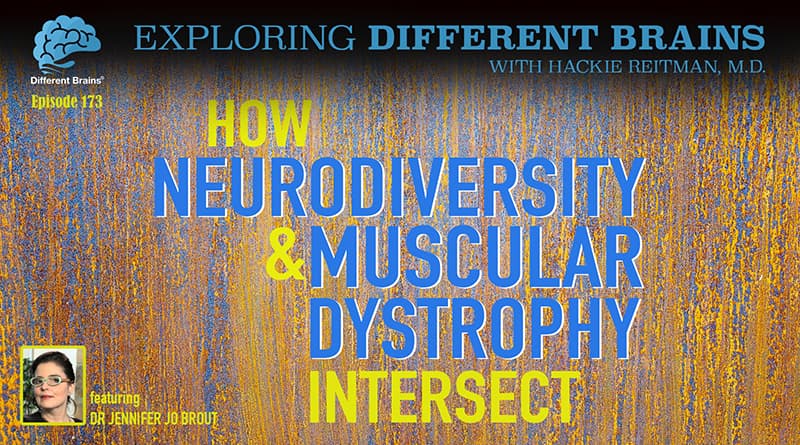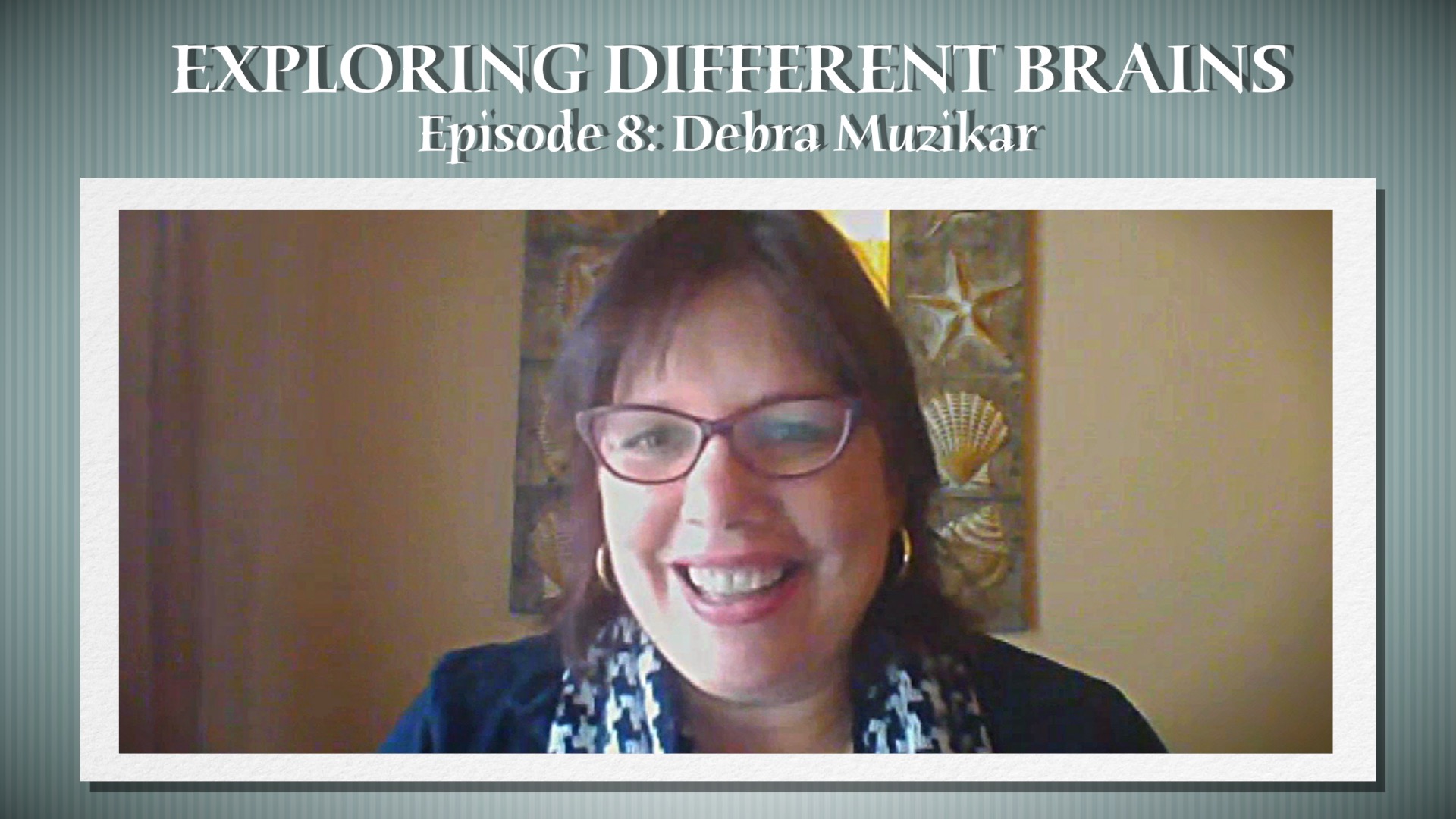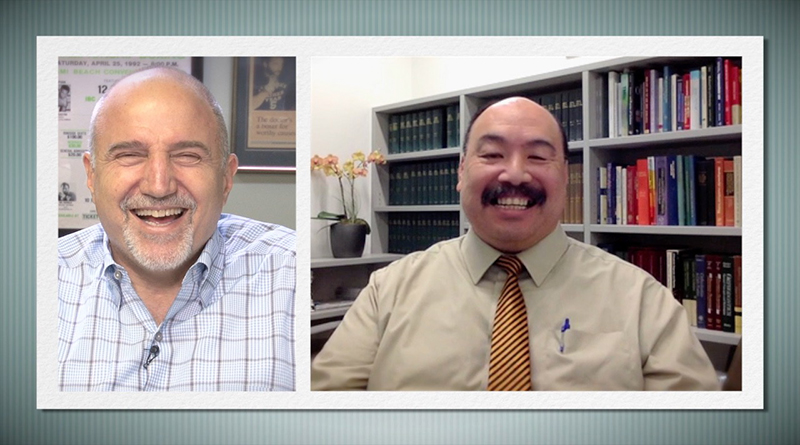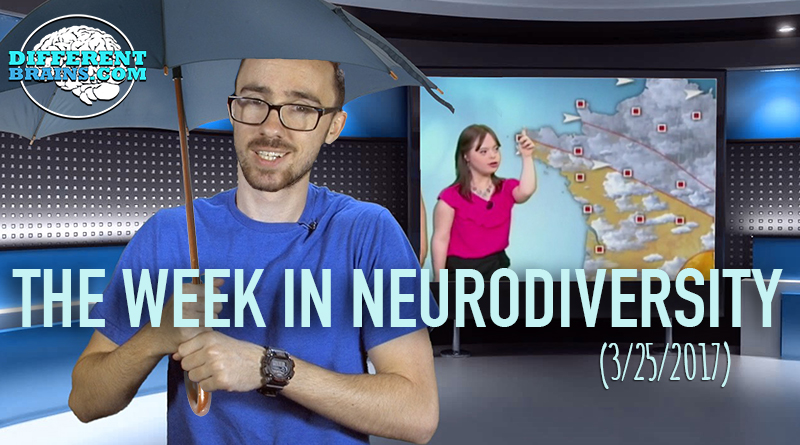
How Neurodiversity & Muscular Dystrophy Intersect, with Dr. Jennifer Jo Brout | EDB 173
In this episode Dr. Hackie Reitman continues his conversation with Jennifer Jo Brout, Psy.D., NYC Chapter Director for the FSH Society.
(24 mins) Dr. Brout is one of the world’s authorities on the condition known as Misophonia, and has the condition herself. She established the Duke University Sensory Processing and Emotion Regulation Program, and is the founder of the International Misophonia Research Network. She also lives with FSHD – a form of muscular dystrophy, and is the director of the New York City chapter of the FSH Society. Dr. Brout discusses the challenges related to having muscular dystrophy, and looks at what the psychological effects and comorbidities of the condition are. For more about the FHS Society: fshsociety.org
For more about Misophonia and Dr. Brout, visit:
www.misophoniainternational.com
JJB Counseling and Consultation: www.sensationandemotionnetwork.com
For information about the Duke University Sensory Processing and Emotion Regulation Program, visit: dukescience.org/content/misophonia
Dr. Brout will be hosting a webinar, “Parenting Your Misophonia Child or Teenager” July 30th, 2019 at 7:30PM EST and 7:30PM PST, via Zoom. For price and more information click here.
To listen or download the podcast version of this episode, see the embedded player below.
Or look for us on your favorite podcast provider:
iTunes | Stitcher | SoundCloud
FULL TRANSCRIPTION
Advocating for Muscular Dystrophy and Neurodiversity
HACKIE REITMAN (HR): Hi, I’m Dr. Hackie Reitmann, welcome to another episode of Exploring Different Brains, and today we have one our favorite returning guests, Dr. Jennifer Jo Brout- the world’s authority on misophonia, very knowledgeable about Muscular Dystrophy and so much more. Jennifer, welcome back to Exploring Different Brains!
JENNIFER JO BROUT (JB): Thank you, it’s great to be here, Hackie!
HR: I saw your interest in muscular dystrophy, and I was thinking to myself, “there’s something since long long ago apart of my Boston University Orthopedic residency, was the Shriner’s Hospital for Children in Springfield, Mass., where we used to see quite a bit of this, that I’ve become ignorant over the years.” So I, when I read that about you said, “I’ve gotta ask Jennifer Jo Brout all about muscular dystrophy!
JB: Well, I’m sure you’re not ignorant, however! (chuckles) So, this is really a very interesting story. My grandfather, Paul Cohn, my late grandfather, founded the muscular dystrophy association in the 1950’s. Unfortunately, he passed away, not of a muscular dystrophy related illness, but he passed away in the mid sixties. So as it was starting, he unfortunately passed away and- but he started the telethon, he was best friends with Jerry Lewis and Dean Martin, and, well, you know, I- last time I saw him here on this Earth was when I was four, so I don’t know I feels like a dream, but I don’t know. But- so he had a certain type of muscular dystrophy, called Thasio-scapular humeral, which is another mouthful of a name. But he began the- he had a very mild version of it, but he saw nobody was researching it, and he started the Foundation, the muscular dystrophy Association has become huge, and what happened between the time that my grandfather founded it, and now, is this sort of Revolution in understanding that we have it in genetics. Which is what’s happening in the next 10 years- I mean in the last ten years. So in the last ten years, there’s been a lot of forward movement with the research, and in fact, when my grandfather- I should also give credit to Abe Melerat, Abe Melerat excuse me, who’s also a doctor that founded MDA with my grandfather, and at the time they thought it was one or maybe two different types of diseases well it turns out it’s over forty diseases with different causes, some are genetic, some are epigenetic, some are more neurology based, you know. So some are more autoimmune based, so there’s all these different types of muscular dystrophies. The one that I have in my family in Thasio-Scapular Humoral, which was named for the Thasio faced, scapular- the sort of wings in your back, sticking out, and humoral meaning sort of the shoulder girdle. Of course, that’s really named incorrectly because as it turns out, you can really have weakness in any different part of your body. So I was diagnosed at age fifty-four. When I started to become weak, you know in terms of my legs, around where I was fifty and it took about four years to get the correct diagnosis. So you know, I’m in th The Learning Stages about it, there’s a lot of promising research but as always it’s very very complicated.
HR: Well, in my -it’s my belief, when you have something systemic such as muscular dystrophy, which is a problem with one of the proteins and- and so forth, with the muscle- that your brain has to, by necessity rewire itself, because you’re using all your muscles differently.
JB: You’re absolutely right. You’re absolutely right.
HR: And the pan-ultimate of that is- I had a discussion when I was on a panel with JR Harding whose th special advisor to the pro-vost at University of Florida for disabilities, because he broke his neck twice, and he’s in a wheelchair and is quadrilplegic, but almost paraplegic, but he’s completely independent- he’s married, he’s a funny guy too. I asked him on the panel “How do you break your neck twice?” which he explained to me, but we were talking about that very thing, because then you have to get into, depending on the severity of what you’re dealing with, you have to get into the use of assistive Technologies-
JB: Right.
HR: Almost to the point where your homological neurological system has to adapt in a special way to this.
JB: You’re absolutely correct, and it’s interesting that I hadn’t thought of that and I haven’t seen anything even written about that, ’cause that’s kindof a global perspective, where everyone’s looking at the genes, the genes, the genes now. But you’re absolutely right and I’m just baffled that you said that, I think that’s brilliant Hackie, really!
HR: Well, even a broken clock is right twice a day, you know?! (chuckles)
JB: (chuckles)
FSH Research
HR: I have my rare moments, but I now you’re affiliated with Duke…?
JB: Well I’m affiliated with Duke in that I founded the originally it was called the “sensation and emotion regulation program”, we’ve now changed it to the “misophonia and emotional regulation program”, and I’m also affiliated now with the FSH Society so the MDA that my grandfather founded is doing a lot of work, they’ve split themselves into doing work for so many different diseases, and that all diseases are important, but there are smaller societies and organizations and non-profits, that are focusing just on curing FSH and one of those is the FSH society, and I am the New York chapter director now.
HR: Do they have any new directions in the research?
JB: Well they do, so much has happened with genetics and epigenetics, so with FSH, you can have the defect of our mutated gene, but-.
HR: -And we should mention to our audience that these rapidly mutate, so you can- go ahead, I’m sorry to interrupt.
JB: No, no no, please, please feel free to add anything. So you- there’s three conditions for FSH, and it’s different for every muscular dystrophy, and for FSH, you have to inherit its autosomal dominance, it just takes one copy from one parent to inherit it- and you can actually have a gene- there’s actually deletions on chromosome 4, the end of the chromosome. So one, you have to have the deletions. But that alone doesn’t give you FSH. You have to also have, at the end of the chromosome, adjacent to it, there are two variants called alleles, I’m sure you know what they are, I’m sure. So it has to land on the right allele. So you have to get the deletions land on the right part of the chromosome, and then the third condition that has to happen has to do with methylization so that’s- I’m sure I’m not telling you anything you don’t know.
HR: Oh you are, believe me, I was just an orthopedic surgeon, we’re not too smart.
JB: Well let me tell you, I used to be in orthopedics but thats a different story. So with methylization, that is a prod- that’s sort of the whole process, where the DNA can be changed by the molecules that are added to the DNA by this process methylization. So in FSH muscular dystrophy, the methylization is less. Becauss it’s less, it releases dux-4; Dux-4 is normal in embryonic development, but it’s supposed to be shut off. If it doesn’t get shut off, it’s toxic to the muscles. So there’s many different ways, you can ask this so you can be completely asymptomatic, you can have the mutation and the gene and be completely asymptomatic, which I was for fifty years, and you know, neither of my parents are symptomatic- well it would be in my grandfather’s line, no one else is symptomatic, only on one side of my family. So, you know, because the gene can be activated or not activated, turned on or off, it’s a whole new world. But the good news about that is it gives you a downstream process to intervene, like you don’t just have to change the gene which is what some people are doing with something like CRISPR, you know where they can change the sequence; you can also stop dux 4 from being developed, and well, what’s mainly being worked on right now, is something- a medication that will inhibit dux 4; that will stop the progression.
HR: And all the principles you just espoused with the deep science behind it, are also the same principles- not just for this- but for so many of the things that explain neurodiversity and so forth and- and you know, totally. it’s it’s all why we see more similarities between all of these things than there are differences, and something that’s a little bit confusing for me, if it’s true that it’s autosomal dominant genes, okay, so then now the- it seems that the females are affected much less with certain of the muscular dystrophies, but they carry the genes more. They’re carriers, but they’re not-
JB: That is- yes, you’re right that is true of some of the muscular dystrophies. However, those, you know- FSH is autosomal dominant, but that doesn’t mean that other- all muscular dystrophies are, so- and I think just the whole concept of epigenetics has changed how we think of recessive v. you know, dominant-
Epigenetics and Neurodiversity
HR: I would like to- I want to ask you to- just for the benefit of our audience- I learned a lot from Dr. Malav Triveti, he’s at Nova Southeastern and he was explaining to me in very basic terms, epigenetics and How it kind of steers things and so forth, and you mentioned genes, epigenetics, and now alleles, just to name three of them, could you give us a quick little two minute primer course in this terminology for our audience?
JB: Sure.
HR: Not to put you on the spot or anything.
JB: The easy way, I think to explain it, is you know, the old sort of way of thinking is “if you have a gene, you have a gene.” Now, and that would just be genetics. (inaudible) now what we understand is that both through internal and external processes, a gene can be activated or not. So it’s different than recessive, because recessive means you have to have two copies, so one from each parent, and its likely one parent may not manifest symptoms. Autosomal dominant is you only have to have one copy. But with the idea that genes can be turned on and off, it does kind of shift the whole idea of what genetics really are. It’s very confusing.
Muscular Dystrophy Co-morbidities
HR: It is, and to make it more confusing, could we speak about some of the co-morbidities that go along with some of the muscular dystrophies?
JB: absolutely, so FSH for example, there are part arrythmias, although it does not usually affect the heart muscle in any really deleterious way. There is respiratory dysfunction- not for everyone, and the other thing is it presents so differently in people it’s very hard to say, you know, how fast it’ll progress, where in your body it will hit- you know, it’s just totally mysterious. But given that though, the co-morbidities, and this is interesting, considering misophonia is hearing loss in the high ranges. So, there’s respiratory dysfunction, hearing ranges- the high ranges, heart arrythmia and also pain, and this speaks to what you were saying about the brain formatting based on the disease. So in some sense, you start your body without even knowing it starts to use a muscle that’s a little stronger, and then that muscle starts to hurt. There’s inflammation involved; theres also comorbidity with chronic fatigue, which is one of the things that I think is really important that people don’t realize, is you’re chronically fatigued because your doing a small thing, it feels like a whole workout for many people.
Muscular Dystrophy and Mental Health
HR: And also the- we should mention some of the mental health issues as comorbidities and neurodiversity issues.
JB: The mental health issues are- I’ve thought a lot about it, you know maybe there’s something I can do to help people, but then I thought “well I have to figure this process out for myself first”, and you know, it’s what I have, you know- diagnosed with a progressive disease, it’s very hard to find the “normal”. Because the new normal changes over time. So, a lot of the- I mean depression, absolutely; anxiety, absolutely, and I think a lot of people also end up unable to leave their house a lot, so they’re isolated, and this happens with obviously a lot of diseases and disorders. But I think one of the key problem with this is that it’s such a mystery in terms of how it’s going to progress, and also you can’t really adapt to a new normal. Because the new normal is forever changing
HR: They keep moving those goalposts on you- all the time.
JB: That’s right. So you know, in my thinking about it, what would I say to somebody in my position; I’ve been thinking about that- because you know, you can’t just- there are a lot of therapists that work with chronic pain, you know, you don’t grief counselors, and there are a lot of people who work with people with disease, but the idea of a progressive, mysterious disease is very specific. You know, one day you could be- and the other thing is it waxes and wanes, so like, like misophonia, you know if you’re tired, it’s worse, if you didn’t sleep, its worse, and the other thing of course is employment problems for people. No, it’s interesting when you talk about any disease or disorder, it really a lot of it comes down to the same thing, isolation anxiety, depression, and employment problems.
Tools for Improvement
HR: Yes, and one of the things that we all know, is aside from exercise and Mediterranean style healthy diet and things of that nature that help all of our conditions, no matter what they are- neurological, cancer, diabetes, heart disease, whatever- but the other big big biggy is socialization and strong social relationships, and to get isolated well now you’re going to have more Dementia, you’re gonna have more and more mental health problems, and it goes on and on.
JB: Absolutely, and I would not be surprised I did see in some of the research that some people have reported issues with FSH cognitive issues- not necessarily dementia, but, you know, who knows how that connects, so are you having cognitive issues because you were so anxious, you were so depressed, you’re overloaded, your- your tension is on how you’re getting around, versus what’s going on- but there is or are- is it because you’re so fatigued- so there are cognitive differences, I feel. Oh, and the other thing I should mention I forgot as a co-occurring disorder, if a small part of the population has an eye vessel disorder, which is a whole other thing. So you know, it was named for face, shoulders and your back, and here you’ve got your eyes, your legs, you know, and your brain reconstructing as we know.
HR: Well you got- you’re so enlightening, I’m telling you, that you got to keep up your good work.
JB: I’m trying. I really am.
Learning More About Dr. Jennifer Jo Brout and FSH
HR: Well, you are doing a great job, you’re doing a great job, and we really appreciate it. You’re doing so much and all fronts and it’s wonderful to be able to speak with you again. How do we learn more about you, our audience wants to go to your website and learn more about you and more about misophonia and more about everything we’ve spoken about today where do they go, what do they do?
JB: So for misophonia I would suggest going to misophoniainternational.com, that’s my research. It’s more for doctors, which is misophonia-research which is what I have listed. But then misophonia kids, and then for FSH, I think there are a lot of good non-profits working; I would suggest probably FSH Society, just because I know- I’m working with the people there and they’re just incredibly hardworking, kind people, and you know, they have a four or five- the highest rating for a non-profit and you know every- almost everything goes into the research, which is what you want to see. So people can also go to the Muscular Dystrophy Association, and they have clinics, so you know, but for mental health care, that is the – one of the missing links- that and actually Orthopedics too because you know, I always feel like, “well you know I also have osteo-arthritis in my knee, maybe if I could fix that somehow, I could have more stab- you know, so its one of those whole body, whole mind things going on.
HR: Dr. Jennifer Jo Brout, yet again, thank you for coming back, and thank you for educating us on all that you do, keep up the great work, thanks!
JB: Thank you, Hackie!




